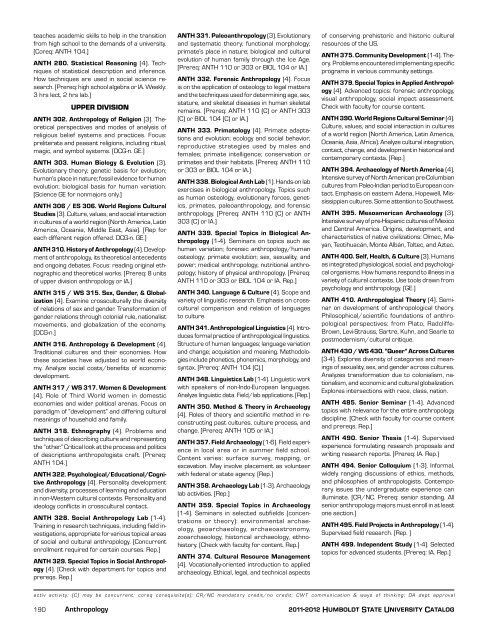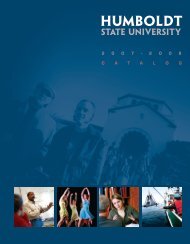2011-12 Academic Year - Bad Request - Humboldt State University
2011-12 Academic Year - Bad Request - Humboldt State University
2011-12 Academic Year - Bad Request - Humboldt State University
Create successful ePaper yourself
Turn your PDF publications into a flip-book with our unique Google optimized e-Paper software.
teaches academic skills to help in the transition<br />
from high school to the demands of a university.<br />
[Coreq: ANTH 104.]<br />
ANTH 280. Statistical Reasoning (4). Techniques<br />
of statistical descrip tion and infer ence.<br />
How tech niques are used in social science research.<br />
[Prereq: high school alge bra or IA. Weekly:<br />
3 hrs lect, 2 hrs lab.]<br />
UPPER DIVISION<br />
ANTH 302. Anthropology of Religion (3). Theo<br />
retical perspectives and modes of an al ysis of<br />
religious belief systems and practices. Focus:<br />
preliterate and peasant religions, including ritual,<br />
magic, and symbol systems. [DCG-n. GE.]<br />
ANTH 303. Human Biology & Evolution (3).<br />
Evolutionary theory; genetic basis for evolution;<br />
human’s place in nature; fossil evidence for human<br />
evolution; biological ba sis for human variation.<br />
[Science GE for nonmajors only.]<br />
ANTH 306 / ES 306. World Regions Cul tur al<br />
Studies (3). Culture, values, and social inter action<br />
in cultures of a world region (North Amer ica, Latin<br />
America, Oceania, Mid dle East, Asia). [Rep for<br />
each dif fer ent region offered. DCG-n. GE.]<br />
ANTH 310. History of Anthropology (4). Development<br />
of anthropology, its theoretical antece dents<br />
and ongoing debates. Focus: reading ori ginal ethnographic<br />
and theoretical works. [Pre req: 8 units<br />
of upper division an thropology or IA.]<br />
ANTH 315 / WS 315. Sex, Gender, & Globalization<br />
(4). Examine crossculturally the diversity<br />
of relations of sex and gender. Transformation of<br />
gender relations through colonial rule, nationalist<br />
movements, and globalization of the economy.<br />
[DCG-n.]<br />
ANTH 316. Anthropology & Development (4).<br />
Traditional cultures and their economies. How<br />
these societies have adjusted to world econ omy.<br />
Analyze social costs/benefits of econom ic<br />
development.<br />
ANTH 317 / WS 317. Women & Development<br />
(4). Role of Third World women in domestic<br />
econ omies and wider political arenas. Focus on<br />
paradigm of “development” and differing cultural<br />
meanings of household and family.<br />
ANTH 318. Ethnography (4). Problems and<br />
techniques of describing culture and representing<br />
the “other.” Critical look at the process and politics<br />
of descriptions anthropologists craft. [Pre req:<br />
ANTH 104.]<br />
ANTH 322. Psychological/Educational/Cognitive<br />
An thro pology (4). Personality development<br />
and diversity; processes of learning and educa tion<br />
in non-Western cul tur al con texts. Personality and<br />
ideology conflicts in cross cultural contact.<br />
ANTH 328. Social Anthropology Lab (1-4).<br />
Training in research techniques, including field investigations,<br />
appropriate for various topical areas<br />
of social and cultural anthro pology. [Con current<br />
enroll ment required for certain courses. Rep.]<br />
ANTH 329. Special Topics in Social Anthropology<br />
(4). [Check with department for topics and<br />
prereqs. Rep.]<br />
ANTH 331. Paleoanthropology (3). Evolutionary<br />
and systematic theory; functional morphology;<br />
primate’s place in nature; biological and cultural<br />
evolution of human family through the Ice Age.<br />
[Prereq: ANTH 110 or 303 or BIOL 104 or IA.]<br />
ANTH 332. Forensic Anthropology (4). Focus<br />
is on the application of osteology to legal matters<br />
and the techniques used for determining age, sex,<br />
stature, and skeletal diseases in human skeletal<br />
remains. [Prereq: ANTH 110 (C) or ANTH 303<br />
(C) or BIOL 104 (C) or IA.]<br />
ANTH 333. Primatology (4). Primate adaptations<br />
and evolution; ecology and social behavior;<br />
reproductive strategies used by males and<br />
females; primate intelligence; conservation or<br />
primates and their habitats. [Prereq: ANTH 110<br />
or 303 or BIOL 104 or IA.]<br />
ANTH 338. Biological Anth Lab (1). Hands-on lab<br />
exercises in biological anthropology. Topics such<br />
as human osteology, evolutionary forces, genetics,<br />
primates, paleoanthropology, and forensic<br />
anthropology. [Prereq: ANTH 110 (C) or ANTH<br />
303 (C) or IA.]<br />
ANTH 339. Special Topics in Biological Anthropology<br />
(1-4). Seminars on topics such as:<br />
human variation; forensic anthro pology/human<br />
osteology; primate evolution; sex, sexuality, and<br />
power; medical anthropology; nutritional anthropology;<br />
history of physical anthropology. [Prereq:<br />
ANTH 110 or 303 or BIOL 104 or IA. Rep.]<br />
ANTH 340. Language & Culture (4). Scope and<br />
variety of linguistic research. Emphasis on crosscultural<br />
comparison and relation of languages<br />
to culture.<br />
ANTH 341. Anthropological Linguistics (4). Introduces<br />
formal practice of anthropological linguistics.<br />
Structure of human languages; language variation<br />
and change; acquisition and meaning. Methodologies<br />
include phonetics, phonemics, morphology, and<br />
syntax. [Prereq: ANTH 104 (C).]<br />
ANTH 348. Linguistics Lab (1-4). Linguistic work<br />
with speakers of non-Indo-European languages.<br />
An alyze linguistic data. Field/lab applications. [Rep.]<br />
ANTH 350. Method & Theory in Archaeology<br />
(4). Roles of theory and scientific method in reconstructing<br />
past cultures, culture process, and<br />
change. [Prereq: ANTH 105 or IA.]<br />
ANTH 357. Field Archaeology (1-6). Field experience<br />
in local area or in summer field school.<br />
Content varies: surface survey, mapping, or<br />
excavation. May involve placement as volunteer<br />
with federal or state agency. [Rep.]<br />
ANTH 358. Archaeology Lab (1-3). Archaeology<br />
lab activities. [Rep.]<br />
ANTH 359. Special Topics in Archaeology<br />
(1-4). Seminars in selected subfields (concentrations<br />
or theory): environmental archaeology,<br />
geoarchaeology, archaeoastronomy,<br />
zooarchaeology, historical archaeology, ethnohistory.<br />
[Check with faculty for content. Rep.]<br />
ANTH 374. Cultural Resource Management<br />
(4). Vocationally-oriented introduction to applied<br />
archaeology. Ethical, legal, and technical aspects<br />
of conserving prehistoric and historic cultural<br />
resources of the US.<br />
ANTH 375. Community Development (1-4). Theory.<br />
Problems encountered implementing specific<br />
programs in various community settings.<br />
ANTH 379. Special Topics in Applied Anthropology<br />
(4). Advanced topics: forensic anthropology,<br />
visual anthropology, social impact assessment.<br />
Check with faculty for course content.<br />
ANTH 390. World Regions Cultural Seminar (4).<br />
Culture, values, and social interaction in cultures<br />
of a world region (North America, Latin America,<br />
Oceania, Asia, Africa). Analyze cultural integration,<br />
contact, change, and development in historical and<br />
contemporary contexts. [Rep.]<br />
ANTH 394. Archaeology of North America (4).<br />
Intensive survey of North American pre-Columbian<br />
cultures from Paleo-Indian period to European contact.<br />
Emphasis on eastern Adena, Hopewell, Mississippian<br />
cultures. Some attention to Southwest.<br />
ANTH 395. Mesoamerican Archaeology (3).<br />
Intensive survey of pre-Hispanic cultures of Mex ico<br />
and Central America. Origins, development, and<br />
characteristics of native civilizations: Olmec, Mayan,<br />
Teotihuacán, Monte Albán, Toltec, and Aztec.<br />
ANTH 400. Self, Health, & Culture (3). Humans<br />
as integrated physiological, social, and psychological<br />
organisms. How humans respond to illness in a<br />
variety of cultural contexts. Use tools drawn from<br />
psychology and anthropology. [GE.]<br />
ANTH 410. Anthropological Theory (4). Seminar<br />
on development of anthropological theory.<br />
Philosophical/scientific foundations of anthropological<br />
perspectives: from Plato, Radcliffe-<br />
Brown, Levi-Strauss, Sartre, Kuhn, and Searle to<br />
postmodernism/cultural critique.<br />
ANTH 430 / WS 430. “Queer” Across Cultures<br />
(3-4). Explores diversity of categories and meanings<br />
of sexuality, sex, and gender across cultures.<br />
Analyzes transformation due to colonialism, nationalism,<br />
and economic and cultural globalization.<br />
Explores intersections with race, class, nation.<br />
ANTH 485. Senior Seminar (1-4). Advanced<br />
topics with relevance for the entire anthropology<br />
discipline. [Check with faculty for course content<br />
and prereqs. Rep.]<br />
ANTH 490. Senior Thesis (1-4). Supervised<br />
experience formulating research proposals and<br />
writing research reports. [Prereq: IA. Rep.]<br />
ANTH 494. Senior Colloquium (1-3). Informal,<br />
widely ranging discussions of ethics, methods,<br />
and philosophies of anthropologists. Contemporary<br />
issues the undergraduate experience can<br />
illuminate. [CR/NC. Prereq: senior standing. All<br />
senior anthropology majors must enroll in at least<br />
one section.]<br />
ANTH 495. Field Projects in Anthropology (1-4).<br />
Supervised field research. [Rep. ]<br />
ANTH 499. Independent Study (1-4). Selected<br />
topics for advanced students. [Prereq: IA. Rep.]<br />
activ activity; (C) may be concurrent; coreq corequisite(s); CR/NC mandatory credit/no credit; CWT communication & ways of thinking; DA dept approval<br />
190 Anthropology<br />
<strong>2011</strong>-20<strong>12</strong> <strong>Humboldt</strong> <strong>State</strong> <strong>University</strong> Catalog

















